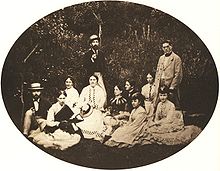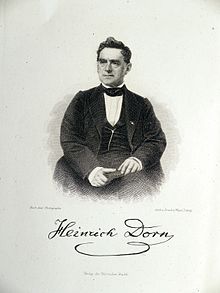Heinrich Dorn (composer)
Heinrich Ludwig Egmont Dorn (* 14. November 1804 in Königsberg , † 10. January 1892 in Berlin ) was a German composer of the Romantic and conductor , music director and music critic .
Live and act
Dorn studied from 1823 at the Humboldt University of Berlin , first Law , but then devoted himself to the art of music and formed under Ludwig Berger , Bernhard Klein for piano player as well as Bernhard Klein and Carl Friedrich Zelter for composers. As early as 1826 his first opera, Roland's Knappen , for which he wrote the text himself, was performed in Berlin with applause.
After that, Dorn temporarily took over a teaching position at a music institute in Frankfurt am Main and then as music director at the opera house in Königsberg. Here he premiered his second opera, Die Bettlerin (text by Karl von Holtei ), in 1828 . In 1830 he was given the position of music director at the newly opened electoral court theater in Leipzig . Here he became the composition teacher of Robert Schumann and Clara Wieck, among others, and brought the ballet Amors Macht and his third opera, Abu Kara (text by Ludwig Bechstein ), to the stage in 1831 , but without much applause.
After the dissolution of these theater ventures, Dorn moved to Hamburg and temporarily directed the Hamburg Philharmonic . He then went to Riga , where he was given a position as the city's music director and, from 1836, at the same time as the director of the theater orchestra, where Richard Wagner was also active as conductor from 1837 to 1839 . Here, in 1836, Dorn organized the first and highly regarded music festival of the Russian Baltic Sea provinces and in 1838 premiered his fourth opera, which was repeated with great acclaim: The Alderman of Paris and in 1841 his fifth opera, The Banner of England .

At the beginning of 1843, Dorn moved to the Schauspiel Köln and was employed here as the successor to Conradin Kreutzer as municipal Kapellmeister and concert conductor of the Gürzenich Orchestra Cologne . Two years later he founded the Rheinische Musikschule , where he also taught composition, singing and playing the piano. In the years 1844 and 1847, Dorn was festival director of the Niederrheinische Musikfest in Cologne, at the first of which he performed Beethoven's great mass in Germany in full for the first time in Germany.
After Otto Nicolai's death in Berlin in 1849, Dorn was appointed his successor as Kapellmeister and conductor at the royal court theater and in the same year also a member of the Royal Prussian Academy of the Arts in Berlin . However, unexpectedly he was retired early in 1869 with the title of professor together with his musical director Wilhelm Taubert . He then took on a position as a lecturer at the Kullak Academy in Berlin and as a music critic for the Neue Berliner Musikzeitung .
family
Heinrich Dorn was married to Minna Zettel, with whom he had several children. From Dorn's sons, his son Alexander (1833–1901) worked as a piano teacher at the Berlin University of Music ; Another son, Otto (1848–1931), became known for a number of effective orchestral compositions after winning the first prize of the Meyerbeer Foundation in 1873 .
Works (selection)
- The Rolands Knappen , heroic-comic opera in two acts, op. 1, (Berlin, 1826)
- Artaxarxes Overture, (Berlin and Königsberg, 1828)
- The Beggaress , Singspiel in four acts, (Text: Karl von Holtei), (Königsberg, 1828)
- Cupid's Power , ballet, (Leipzig, 1830)
- Abu Kara , romantic opera in three acts, op.18, (Text: Ludwig Bechstein), (Leipzig, 1831)
- The Swan Girl , Quartet, (April 8, 1834 Riga),
- The Alderman of Paris , comic opera in two acts, (Libretto: Wilhelm August Wohlbrück ), (Riga November 1, 1838)
- The Banner of England , romantic opera in four acts, (Libretto: Carl Alt after Walter Scott ), (Riga, 1842)
- Die Nibelungen , Opera in five acts, op. 73, (1854), ( libretto by Eduard Gerber), which premiered on March 22, 1854 in Weimar under the direction of Franz Liszt and which was a great success even before Wagner's Der Ring des Nibelungen has been;
- A day in Russia , comic opera in two acts, (Text: Johann Christoph Grünbaum after Eugène Scribe ) (Berlin, 1856),
- The messenger from Pirna , comic opera in three acts, (Libretto: Moritz Heydrich nach Mélesville), (Berlin, 1865)
- Thunderstorm in Sunshine , one-act operetta, (Libretto: Charles Nuitter), (Berlin, 1866);
- Victory Festival Sounds , Opera (Berlin, 1866)
- numerous songs and chants, instrumental compositions, etc., all of which show a fine talent and a good musical education, but nevertheless have not been able to achieve great and general sympathies.
A number of literary works such as:
- From my life - memories , (Berlin, 1870–72)
- Ostracism. A court shards , (Berlin, 1875);
- Results from experiences , (Berlin, 1877)
- Forays into the field of music art , (Berlin, 1879)
- Quodlibert , (Berlin, 1886)
literature
- Robert Eitner: Dorn, Heinrich . In: Allgemeine Deutsche Biographie (ADB). Volume 48, Duncker & Humblot, Leipzig 1904, pp. 35-37.
- Willi Kahl: Dorn, Heinrich. In: New German Biography (NDB). Volume 4, Duncker & Humblot, Berlin 1959, ISBN 3-428-00185-0 , p. 79 ( digitized version ).
- Adam Rauh: Hans Dorn as an opera composer . Schmidt, Neustadt / Aisch 1939 (also dissertation, University of Munich 1939).
- H. Grohe: Hans Dorn, a colleague of Richard Wagner . In: Neue Zeitschrift für Musik , No. 106, 1939, pp. 706 ff.
- P. Mies: Hans Dorn and the Rheinische Musikschule . In: Festschrift to celebrate the founding of the Cologne Conversation in 1850 . Koenig, Cologne 1950, p. 11
- Thorn . In: Meyers Großes Konversations-Lexikon . 6th edition. Volume 5, Bibliographisches Institut, Leipzig / Vienna 1906, pp. 134–135 .
- Helmut Scheunchen: Lexicon of German Baltic Music. Harro von Hirschheydt publishing house, Wedemark-Elze 2002. ISBN 3-7777-0730-9 . Pp. 58-60.
Web links
- Works by and about Heinrich Dorn in the German Digital Library
- Sheet music and audio files by Heinrich Dorn in the International Music Score Library Project
- Catalog of works on Klassika
- Dorn, Heinrich . In: East German Biography (Kulturportal West-Ost)
- Songs by Heinrich Dorn on The LiederNet Archive
- Entry to Heinrich Dorn on Klassik Heute
Individual evidence
- ↑ See the short review in: Allgemeine Musikische Zeitung July 1829, No. 29, Sp. 485-486 ( digitized in the Google book search).
| personal data | |
|---|---|
| SURNAME | Dorn, Heinrich |
| ALTERNATIVE NAMES | Dorn, Heinrich Ludwig Egmont (full name) |
| BRIEF DESCRIPTION | German Romantic composer, conductor and music director |
| DATE OF BIRTH | November 14, 1804 |
| PLACE OF BIRTH | Königsberg (Prussia) |
| DATE OF DEATH | January 10, 1892 |
| Place of death | Berlin |
